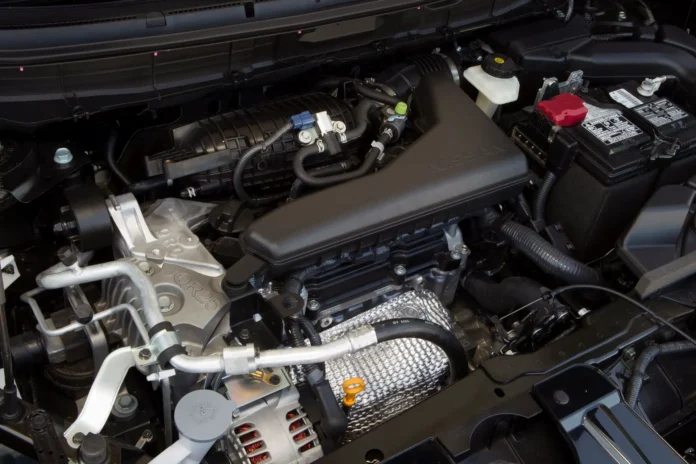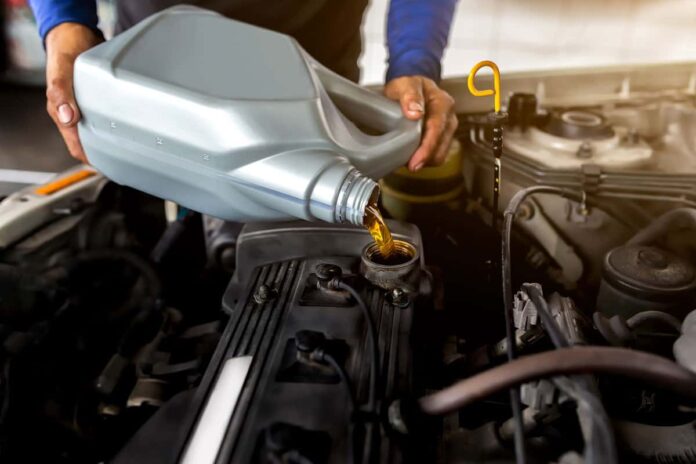The Nissan Rogue, known for its stylish design and impressive performance, has become one of the most popular compact SUVs on the market. One of its key selling points is its commendable fuel efficiency, which not only benefits the environment by reducing greenhouse gas emissions but also saves drivers money at the gas pump. This article will explore engine oil’s crucial role in achieving better fuel efficiency for your Nissan Rogue and provide insights on optimizing it for the best possible performance.
Fuel efficiency is a top priority for many drivers as it directly impacts both their wallets and the environment. A more fuel-efficient vehicle means fewer trips to the gas station, translating to significant cost savings over time. In addition, improved fuel efficiency reduces our carbon footprint and reliance on fossil fuels, promoting a cleaner, greener future for all.
Engine oil is vital in optimizing fuel efficiency by reducing friction and heat within the engine. The right type and grade of oil can significantly improve the engine’s overall performance, ensuring smooth operation and prolonging its lifespan. In the following sections, we will delve into the relationship between engine oil and fuel efficiency, how to choose the right oil for your Nissan Rogue, and tips for maintaining optimal engine oil conditions. Stay tuned for valuable insights that will help you get the most out of your Nissan Rogue while minimizing your environmental impact.
The Relationship Between Engine Oil and Fuel Efficiency

Engine oil is the lifeblood of any vehicle, and its impact on fuel efficiency cannot be overstated. By understanding the relationship between engine oil and fuel economy, you can make informed decisions about the best oil for your Nissan Rogue.
- Reducing friction and heat for better fuel economy: Engine oil serves as a lubricant for the moving parts within the engine. By forming a protective film between these components, it reduces friction and wear, allowing them to operate more smoothly and efficiently. This reduction in friction also leads to less heat generation, which translates into a more efficient engine that consumes less fuel. As a result, using the right engine oil can significantly contribute to better fuel economy.
- The impact of engine viscosity on fuel efficiency: Viscosity refers to the thickness or resistance to flow of a fluid. In the context of engine oils, viscosity plays a critical role in determining fuel efficiency. Thinner types (lower viscosity) flow more easily and are quicker to reach the various engine parts, reducing friction and improving fuel economy. However, thinner oils may not provide adequate protection under high-stress conditions or extreme temperatures. Therefore, it is essential to choose an engine oil with the appropriate viscosity for your Nissan Rogue, considering factors such as climate and driving conditions.
- The importance of using the right type and grade of oil for your Nissan Rogue: Using the correct type and grade of oil is crucial for maintaining optimal fuel efficiency. Different engines have varying requirements, and using the wrong oil can lead to increased friction, reduced performance, and decreased fuel efficiency. Refer to your Nissan Rogue owner’s manual for the manufacturer’s recommended oil type and viscosity grade, which are designed to provide the best balance of protection, performance, and fuel economy for your specific vehicle.
Understanding the relationship between engine oil and fuel efficiency is crucial for optimizing your Nissan Rogue’s performance. By reducing friction and heat, selecting the appropriate viscosity, and using the right type and grade of oil, you can significantly enhance your vehicle’s fuel economy and contribute to a cleaner, greener environment.
Choosing the Right Engine Oil for Your Nissan Rogue

Selecting the appropriate engine oil for your Nissan Rogue is essential for maximizing fuel efficiency and ensuring optimal performance. Here, we’ll discuss the recommended oil types and grades, the benefits of synthetic oil, and the role of oil additives in improving fuel efficiency.
Recommended oil types and grades for various Nissan Rogue models: While it’s essential to consult your owner’s manual for the exact specifications, the following recommendations generally apply to Nissan Rogue models:
- 2008-2013 Nissan Rogue (S, SL, SV): 5W-30 or 10W-30 (API SM, SN, or ILSAC GF-4, GF-5)
- 2014-2021 Nissan Rogue (S, SL, SV, Platinum): 0W-20 (API SN, SN PLUS, or ILSAC GF-5, GF-6)
- 2021-2024 Nissan Rogue Sport: 0W-20 (API SN, SN PLUS, or ILSAC GF-5, GF-6)
These recommendations may vary slightly based on factors such as climate and driving conditions. Always refer to your owner’s manual for the most accurate information.
Benefits of synthetic oil over conventional oil in terms of fuel efficiency: Synthetic oils are chemically engineered to provide superior performance compared to traditional mineral oils. They offer several advantages that contribute to improved fuel efficiency:
- Better low-temperature fluidity: Synthetic oils flow more easily at low temperatures, reducing friction during cold starts and resulting in better fuel economy.
- Improved high-temperature stability: Synthetic oils are more resistant to thermal breakdown, maintaining their protective qualities even under extreme heat and high-stress conditions. This leads to consistent fuel efficiency throughout the oil change interval.
- Longer oil change intervals: Synthetic oils generally last longer than conventional oils, which means fewer oil changes and less waste. This indirectly contributes to better fuel efficiency by reducing the overall environmental impact.
The role of oil additives in improving fuel efficiency: Oil additives are chemical compounds designed to enhance the properties of engine oil. Some additives claim to improve fuel efficiency by reducing friction, minimizing wear, and maintaining optimal engine performance. While certain additives can provide marginal improvements in fuel efficiency, it is essential to exercise caution when using them. Always research the specific additive’s compatibility with your engine oil and follow the manufacturer’s recommendations to avoid potential damage to your engine.
Choosing the right engine oil for your Nissan Rogue involves selecting the recommended type and grade, considering synthetic options, and understanding the role of oil additives. By doing so, you’ll be well-equipped to maintain your vehicle’s fuel efficiency and ensure optimal performance for years to come.
Tips for Maximizing Fuel Efficiency with Proper Engine Oil Maintenance
Proper engine oil maintenance is essential for maximizing fuel efficiency and ensuring the longevity of your Nissan Rogue. In this section, we’ll share some tips to help you keep your engine oil in optimal condition, which will, in turn, contribute to better fuel economy.
- Importance of regular oil changes and following manufacturer’s guidelines: Regular oil changes are crucial for maintaining your engine’s performance and fuel efficiency. Over time, oil degrades and accumulates contaminants, reducing its ability to lubricate and protect the engine effectively. By following the manufacturer’s recommended oil change intervals (usually specified in your owner’s manual), you’ll ensure that your engine always has clean and fresh oil, minimizing friction and maintaining fuel efficiency.
- The role of the filter in maintaining fuel efficiency: The oil filter plays a significant role in keeping your engine’s fuel efficiency by capturing and removing contaminants from the oil. A clogged or dirty oil filter can reduce the flow of oil, leading to increased friction and wear on engine components, ultimately decreasing fuel efficiency. To maintain optimal fuel economy, replace the oil filter at every oil change or according to the manufacturer’s recommendations.
- Monitoring the oil level and topping off when necessary: Checking your engine oil level regularly is essential for maintaining fuel efficiency. Low levels can lead to increased friction and wear, as well as potential engine damage. To check your oil level, park your vehicle on a level surface, and wait for the engine to cool. Then, pull out the dipstick, wipe it clean, reinsert it, and pull it out again to read level. If the level is below the “full” mark, top it off with the appropriate type and grade of oil. Doing this regularly will help ensure optimal engine performance and fuel economy.
- Checking for oil leaks and addressing them promptly: Oil leaks can lead to low oil levels, increased friction, and decreased fuel efficiency. Regularly inspect your vehicle for signs of oil leaks, such as oil stains on the ground where your vehicle is parked or a burning smell while driving. If you notice any signs of an oil leak, address the issue promptly by consulting a professional mechanic. Fixing leaks promptly will help maintain fuel efficiency and prevent further damage to your engine.
By adhering to these tips and ensuring proper engine oil maintenance, you’ll be well on your way to maximizing fuel efficiency in your Nissan Rogue. Remember that a well-maintained engine not only saves you money on fuel but also contributes to a cleaner, greener environment.
Other Factors Affecting Fuel Efficiency in Your Nissan Rogue

While engine oil plays a significant role in fuel efficiency, several other factors can influence your Nissan Rogue’s fuel economy. In this section, we will briefly mention additional factors such as tire pressure, driving habits, and overall vehicle maintenance and encourage readers to adopt eco-driving practices for further improvement.
- Tire pressure: Maintaining proper tire pressure is crucial for fuel efficiency. Underinflated tires can increase rolling resistance, causing your engine to work harder and consume more fuel. Check your tire pressure regularly (at least once a month) and inflate them to the recommended levels specified in your owner’s manual or on the tire information placard located on the driver’s side door jamb.
- Driving habits: Your driving style can have a significant impact on fuel efficiency. Aggressive driving, such as rapid acceleration and hard braking, can increase fuel consumption. To improve fuel economy, adopt a smoother driving style, maintain a steady speed, and anticipate traffic conditions to avoid sudden stops and starts. Utilize cruise control when appropriate and avoid excessive idling.
- Overall vehicle maintenance: Keeping your Nissan Rogue well-maintained is essential for optimal fuel efficiency. Regularly scheduled maintenance, such as tune-ups, air filter replacements, and spark plug replacements, can help maintain your engine’s performance and efficiency. Always follow the manufacturer’s recommended maintenance schedule to ensure your vehicle is operating at its best.
- Eco-driving practices: Adopting eco-driving practices can further improve your fuel economy. Some eco-driving tips include:
- Gradually accelerating and maintaining a steady speed
- Coasting to a stop instead of hard braking
- Removing excess weight from your vehicle
- Minimizing the use of air conditioning and other energy-consuming accessories
- Planning your route to avoid traffic congestion and reduce stop-and-go driving
By considering these additional factors and adopting eco-driving practices, you can further improve your Nissan Rogue’s fuel efficiency, saving money and reducing your environmental impact. A well-maintained and efficiently-driven vehicle is not only more enjoyable to drive but also contributes to a cleaner, greener future for everyone.
Conclusion

Understanding the importance of using the correct engine oil and following proper maintenance practices is crucial for getting the most out of your Nissan Rogue’s fuel efficiency. By choosing the correct oil type and grade, keeping an eye on oil levels, and adhering to the manufacturer’s guidelines for both oil changes and overall vehicle maintenance, you can significantly improve your vehicle’s performance and fuel economy.
In addition to engine oil, don’t forget to consider other factors, such as tire pressure and driving habits, that can also impact fuel efficiency. By adopting eco-driving practices, you’ll be able to go the extra mile in ensuring optimal fuel economy for your Nissan Rogue.
You can also check the Nissan Rogue oil capacity. Empower yourself with the proper knowledge and a proactive approach, and you’ll not only save money on fuel but also play your part in reducing emissions and creating a cleaner, greener future for everyone. Remember, small changes can make a big difference when it comes to fuel efficiency and environmental impact.









